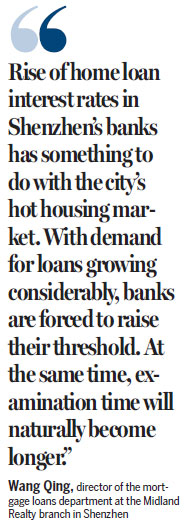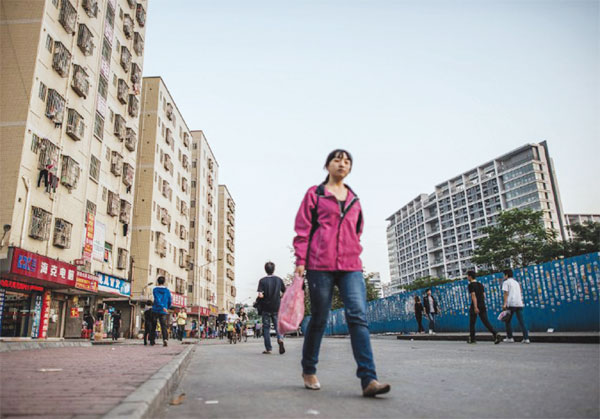Red-hot Shenzhen market bucks the trend on cheaper home loans
Updated: 2015-06-24 07:56
By Zhou Mo in Shenzhen(HK Edition)
|
|||||||
Shenzhen residents found their joy short-lived this month.
The joy came on reports that the easing of policy on second-home purchases would be implemented in the city, and that the Bank of East Asia (BEA) was allowing a 40 percent down payment for second home buyers yet to pay off their first mortgage.
BEA, however, later denied the news.
An employee of the bank told China Daily that BEA had introduced the program on June 11, but "it was suspended last Thursday (June 18)". She did not say when or whether it would be resumed.
The central bank launched a new policy on March 30 aimed at boosting the flagging mainland housing market. According to the policy, first-time buyers can enjoy a minimum down payment ratio of 20 percent. And second home buyers who have paid off their first home loans can also be viewed as first-time buyers and are qualified for a minimum down payment ratio of 30 percent.
Those yet to pay off the mortgage on their first homes can enjoy a down payment ratio of just 40 percent.
The regulation has, since then, been put in place in several mainland cities, but implementation in first-tier cities has been slower, partly because of the voracious demand.
As of early June, seven among 26 banks in Shanghai have offered programs that allow second-time home buyers carrying loan debt to pay 40 percent as down payment for their second homes. Industrial and Commercial Bank of China recently confirmed the same offer in Beijing.
In Shenzhen, however, no lender so far has offered such a low ratio, with down payment requirements for second homes in the coastal Guangdong city largely remaining at 70 percent.
The difference between Shenzhen and other mainland cities can be partly explained by its strong reaction to the new housing policy, which has sparked an explosive surge in home prices since its release.
According to National Bureau of Statistics, monthly growth in prices of new homes in Shenzhen at 6.7 percent was the most robust in May among 70 major and medium-sized mainland cities. Shenzhen was also the only city among the 70 tracked to see prices of new homes in May rise on a year-on-year basis.
"Given the current growth rate in housing prices in Shenzhen, it is nearly impossible that the 40 percent down payment ratio program could be carried out. Otherwise, home prices will see an even more violent surge," a property agent surnamed Tang at Shenzhen Zhonglian Real Estate Consultants Ltd said.
In fact, instead of creating a looser environment for the housing market like other cities have done, Shenzhen is actually tightening its housing policy, with banks now cutting mortgage rate discounts for even first-time home buyers.
Since late May, Bank of China, China Construction Bank, China Merchants Bank and Postal Savings Bank of China have raised their home loan rate levels to 95 or 96 percent of the benchmark interest rate, from mainly 93 percent. The examination time for bank loans has also been increased, from one week earlier to two weeks or so currently.
Analysts believe that the big transaction volume in homes, which has stimulated mortgage demand, is the major reason behind the tightening. Between June 15 and 21, as many as 1,443 new homes were sold in Shenzhen, according to data from the city's Urban Planning and Land Resources Commission. Transaction volume of second-hand homes was even more robust over the same week, with 4,016 units sold.
"Rise of home loan interest rates in Shenzhen's banks has something to do with the city's hot housing market. With demand for loans growing considerably, banks are forced to raise their threshold. At the same time, examination time will naturally become longer," says Wang Qing, director of the mortgage loans department at the Midland Realty in Shenzhen.
Real estate analyst Yuan Yuan forecasts that mortgage loan policy in Shenzhen will likely follow the tightening trend and getting cheap mortgage rates from banks may become more difficult.
But Wang dismissed the possibility that rising loan interest rates will dampen the property-buying enthusiasm among investors and so cool the market in the city.
As the central bank has twice lowered the benchmark interest rate this year, property buyers will still find real loan costs lower even when banks cut their mortgage discount rates, Wang pointed out.
Moreover, interest rate cost is currently not a major factor of consideration for investors, who are experiencing a period of rapid and significant housing price growth, Wang added.
First-time buyer Jiang Xinyue, 28, who works in a State-owned enterprise in Shenzhen, consulted a real estate agency about payment details for a 62 square meter second-hand unit in Futian district.
Jiang said she is more concerned about the future prospects of her future apartment than the discount on mortgage rate.
"Compared with the several million yuan involved in buying an apartment, the little reduction in loan interest rate discount cannot make much of a difference. Rather, I think timing is more important. If you buy a home at the right time, added value of your asset will offset the loss you suffered in the interest rate," she pointed out.
sally@chinadailyhk.com

|
Given the strong demand in the homes market, rising mortgage rates are unlikely to dampen the property-buying enthusiasm among investors enough to cool the market in Shenzhen, experts say. Asia News Photo |
|
Analysts believe that the big transaction volume in Shenzhen's homes, which has stimulated mortgage demand, is the major reason behind the city's tightening housing policy. Brent Lewin / Bloomberg |
(HK Edition 06/24/2015 page7)

